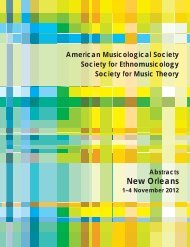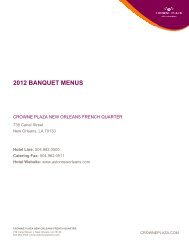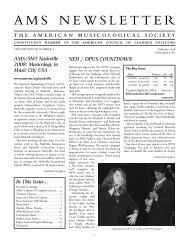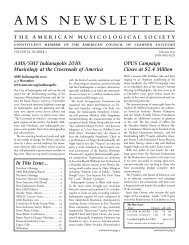AMS Philadelphia 2009 Abstracts - American Musicological Society
AMS Philadelphia 2009 Abstracts - American Musicological Society
AMS Philadelphia 2009 Abstracts - American Musicological Society
You also want an ePaper? Increase the reach of your titles
YUMPU automatically turns print PDFs into web optimized ePapers that Google loves.
98 Friday afternoon <strong>AMS</strong> <strong>Philadelphia</strong> <strong>2009</strong><br />
A smaller number of Kropiński’s compositions were written solely for the pleasure of his closest<br />
friends and performed clandestinely in the barracks.<br />
Kropiński himself smuggled approximately 120 of these works out of the camp, carrying<br />
them with him during a forced death march; these eventually made their way to various archives<br />
in Poland, Germany, and the U.S. after the war. Yet despite the value of this music to an<br />
understanding of the cultural life of Buchenwald camp, and twentieth-century Polish musical<br />
culture more broadly, Kropiński and his music remain virtually unknown to scholars today.<br />
In this paper, I will bring to light a selection of Kropiński’s compositions and explore<br />
their genesis, style and performance contexts. I will consider the conditions that fostered<br />
Kropiński’s astonishing creativity in Buchenwald, and his subsequent total withdrawal from<br />
musical composition after the war. I will also compare Kropińki’s musical activities to those<br />
of prisoners in other Nazi camps who turned to music as a form of psychological escape and<br />
survival. By doing so, I wish to demonstrate that music making in the camps, although to<br />
date almost exclusively represented by materials and testimonies from the “so-called” model<br />
camp, Terezin, was a much more widespread phenomenon than most scholars realize. An<br />
examination of Kropińki’s music thus offers the opportunity to consider the similar coping<br />
strategies that various prisoners turned to despite differing circumstances of imprisonment at<br />
the hands of the Nazis.<br />
SIBELIUS AND THE SS<br />
Timothy Jackson<br />
University of North Texas<br />
There is, even among “serious” scholars, a strong tendency to excuse, even suppress and falsify,<br />
information about heroes, especially those who, like the internationally famous Finnish<br />
composer Jean Sibelius (1865–1957), have inspired a small country like Finland (with all too<br />
few gods in its Pantheon). Looking through the biographies and works lists of famous and<br />
not-so-famous twentieth-century composers in the grove dictionary—and even the new German<br />
music encyclopedia Mgg (not to mention the old Mgg)—frequently does not tell the<br />
real story of what they did—and did not—do during those infamous twelve years 1933–1945.<br />
But if we assume that Propaganda Minister Goebbels was correct that the artist had to take<br />
a position vis-à-vis the National Socialist revolution, then it is unlikely that Sibelius could<br />
remain “unpolitical.” Drawing upon a wide range of previously unknown sources, primarily<br />
drawn from German archives, the paper cites documents showing that Sibelius himself was<br />
not a passive “unpolitical” observer but an enthusiastic, active proponent of the political use<br />
of his music by the Nazi regime. There are many indicators of Sibelius’s sympathetic attitude<br />
to Nazism and the SS. After the Nazis assumed power in 1933 and the wind was blowing from<br />
a different direction, Sibelius repeatedly broke his promise to assist the half-Jewish composer<br />
Gunther Raphael (1903–1960), even though he was the grandson of his esteemed teacher Albert<br />
Becker, falsely claiming that he never wrote recommendations. The tendentiousness of<br />
Sibelius’s excuse is shown by the fact that he did provide references for the SS conductor Dr.<br />
Helmuth Thierfelder (1897–1966) in 1938, which helped him to assume the directorship of the<br />
Lower Saxony Symphony Orchestra that year, and continued to collaborate with Thierfelder<br />
throughout the war. The normally highly-reclusive Sibelius allowed himself to be interviewed<br />
in his home by SS war reporter Anton Kloss in mid-1942, and Kloss’s interview resulted in<br />
various publications in 1942 and ’43. Of special interest are Kloss’s activities up to the time of










